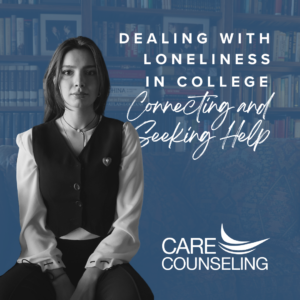Dealing with Loneliness in College
 College life is often portrayed as a time of new friendships, exciting experiences, and personal growth. However, the reality is that many college students face feelings of loneliness as they navigate their academic journey away from home. Loneliness can have a significant impact on mental health and overall well-being, but the good news is that there are proactive steps you can take to address and overcome these feelings.
College life is often portrayed as a time of new friendships, exciting experiences, and personal growth. However, the reality is that many college students face feelings of loneliness as they navigate their academic journey away from home. Loneliness can have a significant impact on mental health and overall well-being, but the good news is that there are proactive steps you can take to address and overcome these feelings.
Understanding Loneliness
Loneliness can affect anyone, regardless of how many people they’re surrounded by. It’s more about the quality of social connections than the quantity. College can be an especially challenging time, as you’re adapting to a new environment, possibly far from familiar faces, and trying to establish your place in a new social context. Loneliness can lead to feelings of isolation, sadness, and a lack of motivation, but remember that you’re not alone in experiencing these emotions.
Reaching Out to Friends
One of the most effective ways to combat loneliness is to reach out to the friends you have or make new ones. Remember that everyone is in a similar boat, seeking connections and friendships. Attend social events, join clubs or organizations that align with your interests, and engage in activities that provide opportunities for interaction. The more you put yourself out there, the greater the chances of finding like-minded individuals with whom you can form meaningful relationships.
Open Conversations
It’s important to remember that you’re not the only one dealing with loneliness. Engage in open conversations with your peers about your feelings. Chances are, they might be experiencing similar emotions. By sharing your experiences, you create an environment where others feel comfortable opening up as well. This not only helps you feel less alone but also fosters a supportive community.
Utilizing Counseling Services
If feelings of loneliness become overwhelming or persist for an extended period, don’t hesitate to seek professional help. Most colleges offer counseling services that can provide you with a safe space to discuss your emotions and receive guidance. Speaking with a trained professional can offer you insights, coping strategies, and the assurance that you’re not alone in your struggles.
Support Groups
Colleges often have support groups that focus on various topics, including loneliness and mental health. Joining a support group can provide you with a sense of belonging and a space to connect with others who are experiencing similar challenges. These groups offer a safe and non-judgmental environment to share your thoughts and feelings, fostering a sense of community.
Online Communities
In today’s digital age, connecting with others doesn’t have to be limited to in-person interactions. There are numerous online communities and forums where you can engage with people who share your interests or struggles. These platforms provide an outlet for communication, expression, and mutual support, even if you can’t physically meet up.
Embrace Solo Activities
While it’s important to connect with others, don’t shy away from embracing solo activities as well. Engaging in hobbies, reading, exercising, or pursuing creative interests on your own can provide a sense of accomplishment and fulfillment. These activities not only keep you engaged but also help you build a positive relationship with yourself, reducing feelings of loneliness.
Volunteer or Part-Time Work
Consider getting involved in volunteer work or part-time employment. These opportunities not only provide a structured environment for social interaction but also allow you to contribute to a cause or community. Giving back can give you a sense of purpose and help alleviate feelings of loneliness.
Cultivating Self-Compassion
Loneliness can sometimes lead to negative self-talk and self-judgment. Cultivating self-compassion is essential during this time. Treat yourself with kindness and understanding, just as you would a friend. Remember that loneliness is a common human experience, and seeking help is a sign of strength, not weakness.
Dealing with loneliness in college can be challenging but remember that there are steps you can take to connect with others and seek support. Reach out to friends, engage in open conversations, utilize counseling services, and support groups, and consider both in-person and online connections. Embrace solo activities, volunteer or work, and practice self-compassion. By taking these steps, you’re not only addressing your loneliness but also actively working towards a more positive and fulfilling college experience. Remember, seeking help and fostering connections are powerful tools on your journey toward improved well-being.



























